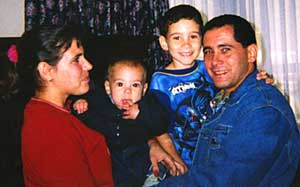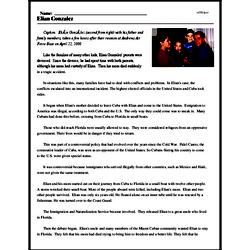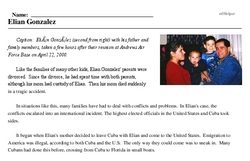Elian Gonzalez
Caption: Eli�n Gonz�lez (second from right) with his father and family members, taken a few hours after their reunion at Andrews Air Force Base on April 22, 2000.
Like the families of many other kids, Elian Gonzalez' parents were divorced. Since the divorce, he had spent time with both parents, although his mom had custody of Elian. Then his mom died suddenly in a tragic accident.
In situations like this, many families have had to deal with conflicts and problems. In Elian's case, the conflicts escalated into an international incident. The highest elected officials in the United States and Cuba took sides.
It began when Elian's mother decided to leave Cuba with Elian and come to the United States. Emigration to America was illegal, according to both Cuba and the U.S. The only way they could come was to sneak in. Many Cubans had done this before, crossing from Cuba to Florida in small boats.
Those who did reach Florida were usually allowed to stay. They were considered refugees from an oppressive government. Their lives would be in danger if they tried to return.
This was part of a controversial policy that had evolved over the years since the Cold War. Fidel Castro, the communist leader of Cuba, was seen as an opponent of the United States. So Cubans fleeing his country to come to the U.S. were given special status.
It was controversial because immigrants who arrived illegally from other countries, such as Mexico and Haiti, were not given the same treatment.
Elian and his mom started out on their journey from Cuba to Florida in a small boat with twelve other people. A storm wrecked their small boat. Most of the people aboard were killed, including Elian's mom. Elian and two other people survived. Elian was only six years old. He floated alone on an inner tube until he was rescued by a fisherman. He was turned over to the Coast Guard.




